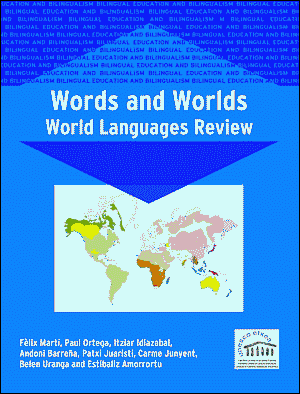
研究室で積ん読状態になっていた言語多様性 (language diversity) に関する本をパラパラとめくってみた.UNESCO ETXEA より2005年に出版された Words and Worlds: World Languages Review という題名の本だ.いつどのような経緯で入手したのかも覚えていないような多数の図書のうちの1冊である.
冒頭の1節を読んでいると,なかなか読ませる英文である.序章 (Prologue) の "The value of language diversity" と小見出しのついた1節の第1段落である (p. x) .以下に引用するので,ぜひ味わっていただければ.
Languages are humanity's most valuable cultural heritage. They are fundamental to understanding. Each language provides a system of concepts which helps us to interpret reality. The complexity of reality is easier to understand thanks to the diversity of languages. Progress in understanding is due, amongst other things, to the growing linguistic diversity that has characterised the human species. Languages are also fundamental in the generation and transmission of values. Each language expresses a differentiated ethical sensibility. Each language provides us with symbols and metaphors to deal with the mysterious and the sacred. Furthermore, languages are not closed or exclusive universes. All of them express the rationality of the human species as well as its common fears and hopes. Linguistic diversity is the most obvious manifestation of cultural diversity. In a world characterised by growing processes of globalisation, it seems necessary to assert the value of cultural diversity as a guarantee of more democratic and more creative coexistence. Cultural uniformity would mean a decline, to the extent that we would lose our ability to give specialised answers to specific challenges. The report "Our Creative Diversity", published by UNESCO in 1995, pointed out what orientations were necessary to preserve diversity without renouncing positive aspects of globalisation in the field of cultural and linguistic diversity. We often coincide with the criteria of the defenders of diversity of living species in the natural environment. In both cases it is said that there is a need to protect the heritage. The reason is not exclusively ethical. Both the defence of biological diversity and the defence of cultural and linguistic diversity are necessary conditions for the well-being of humans, for the balances that protect life and for the life quality we aspire to develop.
言語多様性の問題は生物多様性の問題と平行的に論じられることが多く,その旨がこの引用文でも明確に述べられている.ただし,前者は後者に比べて現代的課題として認知度が低い.
引用の最後にかけて,言語多様性を擁護する理由は倫理的なものだけではない,というくだりにとりわけ説得力を感じた.その点では生物多様性も言語多様性も同じであり,多様性の擁護は,人類の安寧,生活を守るバランス,生活の質の発展のための必要条件なのだという.多様性は "specialised answers to specific challenges" を提供してくれるという議論も同様に説得力がある.
以下,本書の目次を掲げておきたい.パラパラとしか読んでいないが,通読したい本が1冊増えた.
Prologue
Introduction
Chapter 1. Linguistic Communities
Chapter 2. The Linguistic Heritage
Chapter 3. The Official Status of Languages
Chapter 4. The Use of Languages in Public Administration
Chapter 5. Language and Writing
Chapter 6. Language and Education
Chapter 7. Languages and the Media
Chapter 8. Language and Religion
Chapter 9. Transmission and Intergenerational Use of Language
Chapter 10. Linguistic Attitudes
Chapter 11. The Threats to Languages
Chapter 12. The Future of Languages
・ Martí, Fèlix, Paul Ortega, Itziar Idiazabal, Andoni Barreña, Patxi Juaristi, Carme Junyent, Belen Uranga, and Estibaliz Amorrortu. Words and Worlds: World Languages Review. UNESCO ETXEA, 2005.